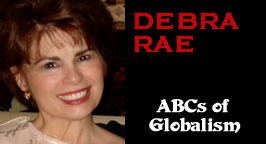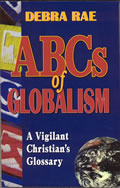ECONOMICS
OF MEGACHURCHIANITY
PART 4
By
Debra Rae
November 7, 2011
NewsWithViews.com
Part 4: Entrepreneurial Leadership Network
As a child, I recall locking arms with classmates while singing a playful little ditty, “the more we get together, together, together; oh, the more we get together, the happier we'll be.” The same rings true today.
Perhaps more than ever, groupthink has become all the rage. Only now it’s accomplished under peer pressure with mutual understanding that ends always justify means. Through the dialectic process,[1] bureaucrats, politicians, “educrats,” and communitarian church leaders discredit notions of fixed rights or wrongs in exchange for a global civic ethic upon which most can agree.[2]
The stealth consensus process primes people of faith for transformation to a new, politically correct, and collectivist paradigm that insiders willingly embrace on behalf of the common good. Bible-thumping naysayers are marginalized as narrow, closed-minded, pesky fundamentalists who have yet to get with the program.[3]
Man-centric Christology
Given today’s new tolerance, deeming most all beliefs to be equal, the broad, transformational movement of emerging Churchianty emphasizes interfaith dialogue. Not to offend is its chief virtue.
Evolutionary change in church governance parallels loose constructionism (or living Constitutionalism). Both ascribe dynamic meanings to core documents—the Holy Bible and U.S. Constitution, respectively. To interpret key biblical and/or constitutional phrases, one abandons the language of original intent for more flexible interpretations.
In today’s Communitarian Church Growth Movement, the biblical hierarchy with God at the top rung of the church ladder has succumbed to that of a concentric circle placing higher-level church leaders at its center with the unchurched community (noncustomers) on its peripheral edge. Alarmingly absent from the model are God Himself and His Word.[4]
Man-centric Leadership Network
Claiming to be “the support ministry for today’s most successful pastors and church leaders,” the Leadership Network markets and promotes church growth[5] by means of a new paradigm not centered in theology, but instead based on the man-centered model of Total Quality Management.[6]
In the Total Quality Management scheme, senior pastors, ministry staff, denominational leaders, theological educators, church consultants, and people committed to mobilizing the laity take center stage in the business structure and human management within the church.
By definition, an entrepreneur is one who undertakes the organization, management, and risks of some business enterprise. Until the 19th century, entrepreneurs were no different from regular capitalists. Over time, however, their function developed into that of coordinating processes necessary to large-scale industry, mega-churches included.
As entrepreneurs, Bob Buford and Fred Smith, Jr. created a network of large-church leaders across the United States. The church Leadership Network crosses denominational and cultural lines to answer this singular question: “How can I be useful to God’s Kingdom?”
Man-centric Best Practice Churches
The
Leadership Network features four basic lines of business: (1) education,
(2) information (e.g., Into Action newsletter), (3) incubation for new
initiates (Leadership Training Network, Church Champions Network, Teaching
Church Network, and Social Entrepreneurs Network), (4) innovation and
research.
A “network of networks,” it reflects the diversity and scope
of evolving ministry tailored to 21st century needs. Over time, interventionist-
and information- networks translate into communication channels, such
as NetFax and NEXT.[7]
Best Practice (big money) churches gravitate to the center of authoritative leadership and serve as models for replication. Because of their innovative and transferrable programs, Best Practice leaders draw major focus in this network. Hence, they attract considerable investment capital.
Mr. Buford founded and served as initial Chairman of the Board of the Peter F. Drucker Foundation for Non Profit Management. In the dedication of his book, he credits Drucker as “the man who formed [his] mind.” A prolific writer, Dr. Drucker specializes in strategy and policy for businesses and nonprofits, as well as in the work and organization of top management.
Dubbed one of the most distinguished thinkers of the 20th century, Drucker is a writer, teacher, and consultant. And he’s participated in Leadership Network learning events for senior pastors and denominational leaders. Since the 1980s, mega-churches have exploded because, he surmises, they’ve discovered that the value of church services to today’s consumers differ from what churches traditionally supplied.
While a minister is obliged biblically to preach all the counsel of God without suppressing or concealing unpopular truth for fear of man, or in pursuit of favor,[8] Drucker disagrees. In his view, management of large pastoral churches is a human enterprise; to man’s credit (not God’s glory), the Communitarian Church paradigm signals “the most significant development in American social history in this century.”
Be sure Drucker’s social universe knows no natural laws or moral absolutes. Even so, using persuasion to sell their product, contemporary mega-churches base their organizational structures and philosophies on this man’s teachings. By forfeiting ostensibly outmoded Bible precedence in order to feather their nests, these religionists choose to conform to worldly culture.[9]
Conformed, Not Transformed
In 21st century America, four major worldviews (1) speak into every possible discipline and (2) define ultimate points of reference—the Imperial Self, the cosmos, the State, or the one true God.[10]
Having researched over 600 books written by social psychologists, who themselves have initiated TQM processes, Dean Gotcher found that all are transformational Marxists; all use “group dynamics” (peer pressure) to ensure compliance with the agenda of top leadership; and all advance a transformative, team-concept management solution that is strongly humanistic. Always with a quality mindset at the forefront, systematic, principled, theory-based, and decentralized management is applied holistically.[11]
It’s thought that the case of the former Soviet bloc (communism) has important application to the American experience (free-market capitalism). Melded together, the two become communitarianism (or commonism). Rather than be renewed by the good, acceptable, and perfect will of God, church communitarians conform to a decidedly humanistic worldview.[12]
21st Century Stewardship
Allegedly a master of stewardship, Mr. John Maxwell formerly pastored Skyline Community Church, in San Diego, CA. He also founded Injoy Ministries, a church consulting firm.[13] An optimist by nature, Maxwell contends that people change when they hurt enough that they have to change, when they learn enough that they want to change, and when they receive enough that they are able to change.
Timing is a critical component of Maxwell’s stewardship theories: Whereas the right decision at the right time leads to success, the wrong decision at the wrong time is a disaster. Moreover, the wrong decision at the right time is a mistake, and the right decision at the wrong time is unacceptable.
Clever, yes, but Maxwell blatantly overlooks the will of God as it relates to the sovereign working of the Holy Spirit. Though the Leadership Network acknowledges that his stewardship seminar flies in the face of traditional belief, it nonetheless endorses Maxwell as a pragmatic, confidence-inspiring agent of change.[14] Change, after all, is what the Church Growth Movement is all about.
After Church Growth, What?
In May 1995, the Leadership Network’s Compass magazine revealed: “The next movement will grow partnerships, not properties … and the relationships will be built on new loyalties and a new, common mission.” When it comes to doctrine, up-and-coming youth leaders are strongly committed to loose constructionism.[15]
No longer fulfilling the biblical role of pastor-teacher, the Young Leader arm of the network self-identifies as valuable human capital, social activists, narrative (as opposed to propositional) preachers, and communitarian church planters committed to the best practices gleaned from human experiences.
The emerging multi-faceted vision for the Church of the 21st Century is for it to become a sort of community center (ideally within biking distance) that provides, as it were, one-stop shopping for health care, food banks, education, and other governmental social programs—i.e., welfare distribution.[16]
One notable example founded by a partnership of churches is the Summerhill Neighborhood, Inc. in Atlanta, Georgia. Its mission is to revitalize Summerhill into a vibrant, growing, and self-sustaining community with a medical center, low-cost clothing store, day-care center, and housing-rehabilitation program.
Crisis of Sovereignty
Humanist Will Durant identifies the greatest question of our time—whether or not man can live without God. For all too many, the answer is “yes.”
Indeed, Christians who buy into the Best Practice Communitarian Church Growth Movement are evolving in doctrine, attitude, and ways of living centered more on relativistic human values than on biblical mandate. Their human dignity and worth are based on self-determination through reason, not Bible truth. In effect, for these, biblical Christology gives way to Secular Humanism.
| Subscribe to the NewsWithViews Daily News Alerts! |
By devaluating New Testament spirituality, even believers court the postmodern fallacy that ours is an age of new images—notably, images that portray Christian fundamentalism as outmoded and, well, downright defunct. In its place, social and ecological justice offers a new story of our origins and culture—this, minus a grand meta-narrative (big story) featuring the God of the Bible.
Too often forgotten is the biblical truth: “Unless the Lord builds the house, they labor in vain who build it; unless the Lord guards the city, the watchman keeps awake in vain.”[17]
Click here for part -----> 1, 2, 3, 4,
Footnotes:
1.
To bring about desired “group think” under peer pressure,
Hegelian dialectic or conflict resolution, otherwise known as the Delphi
Technique, is the communitarian’s attitudinal and behavior modification
tactic of choice.
2.
Fully eight to ten million “freestyle evangelicals” (term
coined by the editor of an interfaith web site, Steven Waldman,) may
well claim to be compelled by conservative theology, but they vehemently
oppose what they condemn as right-wing intolerance and lack of charity
toward the poor. Espousing a non-literal view of the Bible that relies
heavily on German “higher criticism,” left-leaning political
moralists now exalt universal salvation over personal redemption; social
justice over spiritual purity. Theirs is a global civic (New Earth)
ethic that promotes illumined group consciousness and politically correct
eco-socialism driven by bio-centric thought.
3.
Propelled by a social Gospel, a virulent propaganda blitz demonizes
fervent Christianity as even more perilous than Islamic fundamentalism.
Communitarian church leaders align with America’s social, economic,
and academic secular elites to add fuel to the fire.
4.
Romans 11:36.
5.
www.leadnet.org
6.
http://bible.cc/acts/20-27.htm
7.
http://www.crossroad.to/News/Church/Klenck3.html
8.
Acts 20:27, Clarke’s Commentary.
9.
Romans 12:2.
10.
Four major worldviews are Cosmic- and Secular- Humanism, Marxist-Leninism,
and Judeo-Christianity for which ultimate points of reference are the
cosmos, the Imperial Self, the State, or the one true God, respectively.
11.
Bill Creech. The Five Pillars of Total Quality Management. (Plume, New
York: Truman Talley Books, 1994), 5.
12.
Reminiscent of the progressive era of the 1890s—when Methodists
and Presbyterians took up the suffrage movement, then taxation, labor
issues, and general social policy—Pastor Jim Wallis heads “Call
to Renewal.” His is a faith-based, anti-poverty organization that
splits blame for world poverty equally between communist and capitalist
systems.
13.
So-called “positive Christianity” mandates tolerance and
respect in a diverse society, thus moving the church away from God and
salvation and toward resolving the “human condition” through
human intervention and institutions. Comprising thirty- to forty- percent
of the evangelical vote, Christian liberals evidently worry more about
offending man than God. Their stewardship serves the bottom line over
and above the plan and purpose of God.
14.
New-fashioned, politically correct thinking is often called holistic,
systems, or integrated thought. Its united causes include civil/ gender/
sexual orientation rights and radical environmentalism, all of which
effectively elevate man to be “the measure of all things.”
The PC agenda supersedes all other considerations, Bible dogma included
15.
www.youngleader.org.
16.
So-called urban clusters are downsized global commons that implement
environmentally sensitive Smart Growth policies. Said policies undergird
the UN concept of sustainable development, buzzword for wealth redistribution
and population control.
17.
Psalm 127:1, New American Standard (© 1995).












 Share
This Article
Share
This Article






